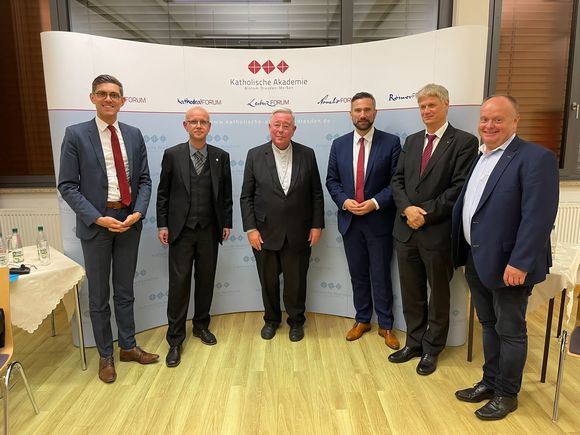As his visit to Plauen and Dresden comes today to an end, Cardinal Jean-Claude Hollerich, as President of the Commission of the Bishops’ Conferences of the EU, pays tribute to the start of the Peaceful Revolution (Friedliche Revolution in German) in Saxony 32 years ago.

Card. Hollerich in Plauen and Desden. (Credit: Archdiocese of Luxembourg)
Beside a prayer for peace followed by an exchange with, among others, the Deputy Prime Minister of the Free State of Saxony, Minister of State Martin Dulig, in Plauen, he discussed the issue with the author Lukas Rietzschel and the former Polish Ambassador, Dr Marek Prawda, last night in the Frauenkirche in Dresden. Cardinal Hollerich called on European politicians to finally put an end to the long queues of countless refugees in inhumane camps, such as on the island of Lesbos, and to put European values into practice in concrete political actions in the future.
Cardinal Hollerich was deeply impressed by his meeting with the theologian, civil rights activist and member of the state parliament Frank Richter: “As a member of the ‘Group of 20’, he succeeded in establishing dialogue on 8 October 1989, when peace between the fronts was hardly going to hold. If we want to shape Europe, we need people who seek peace and trust the Holy Spirit in their actions. With my visit to Saxony, I would like to express my gratitude for the courageous voice of the people 32 years ago. At the same time, I encourage everyone to seek dialogue for a life in freedom. Because freedom cannot be taken for granted”.
On 7 October 1989, 15,000 people peacefully but resolutely took to the streets of Plauen, Saxony, to defend freedom of movement and expression. Although the state authorities and the demonstrators were at odds, the public resistance in Plauen became a central starting point of the Peaceful Revolution. The next day, on 8 October 1989, two chaplains, including Frank Richter, succeeded in ending the major escalations of violence on both sides that had previously taken place during the passage of special trains from Prague, and in seeking a peaceful solution to the conflict. This gave rise to the ‘Group of 20’, which then negotiated the implementation of human rights with the state authorities.
Media
Photo Gallery
